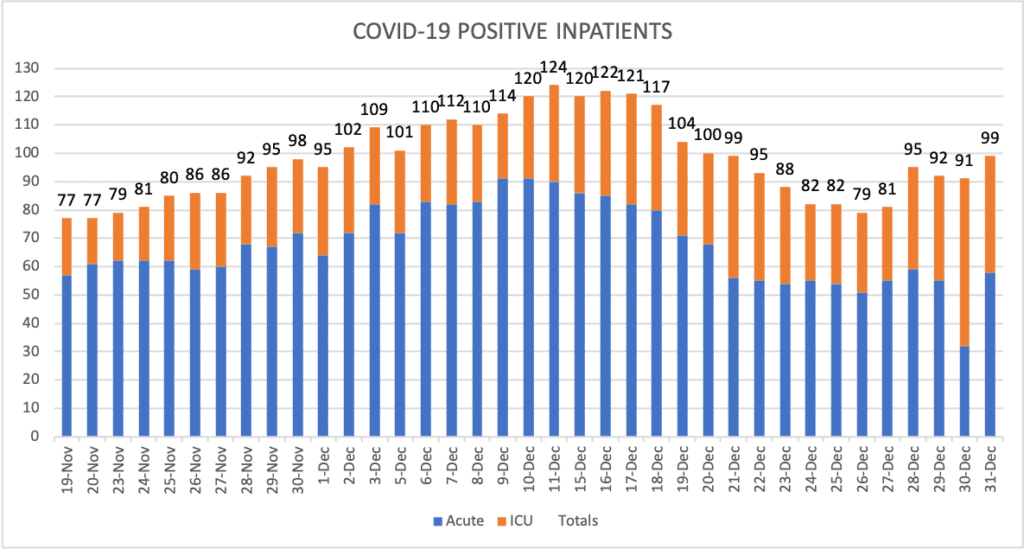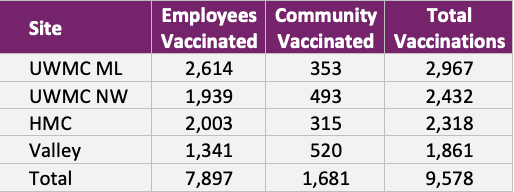As we head into the new year, I want to thank you all for the bravery, resilience and dedication that you have shown over the course of 2020. It has truly been a year like no other. From navigating the first COVID-19 outbreak in the United States, to providing leading insights into exposure and infections metrics, to innovating diagnostic and treatment breakthroughs, UW Medicine has continuously been in the forefront of cutting-edge medicine while providing care for our patients on a daily basis.
Despite how far we’ve come, now is not the time to slow down our efforts. Even with both the Moderna and Pfizer vaccines (see below for a comparison of the two vaccines) rolling out at UW Medicine vaccination clinics, we continue to see too many patients with COVID-19 in our clinics, emergency departments, acute care units and ICUs.
We are proud that we have vaccinated more than 9,500 individuals in our UW Medicine community, including community healthcare and EMS providers, who qualified for their first dose. While we are awaiting further direction from the Washington State Department of Health on the additional priority groups and an associated timeline, we want to reassure you that we will continue to work hard to ensure we offer all remaining UW Medicine employees their vaccinations as soon as possible. Timing is dependent upon the supply of vaccine and ongoing guidance from the Centers for Disease Control and Prevention (CDC) and Washington State Department of Health. We will continue to provide updates as we have them.
Today’s update includes:
- Local/National/Global Epidemiology and Vaccination Summary
- Understanding COVID-19 Vaccines — Pfizer-BioNTech and Moderna
- Employee Assistance Emergency Fund
Local/National/Global Epidemiology

King County: PHSKC is reporting 61,392 total cases and 1,082 deaths as of Wednesday, Dec. 30. The number of new positive tests is currently at 269/14 days/100,000 people. As of Wednesday, Dec. 30, the effective reproductive (Re) number was estimated to be 1.2 (estimate range: 1.0-1.4).
Washington: The Department of Health reports 242,330 cases and 3,420 deaths as of Tuesday, Dec. 29. Of the 3,805,390 people who have been tested, 6.4% have been positive as of Dec. 29.
United States: The Centers for Disease Control and Prevention reports 199,282 new cases on Wednesday, Dec. 30, 19,432,125 total COVID-19 cases and 337,419 deaths as of Dec. 30.
Global: The WHO COVID-19 Dashboard as of Thursday, Dec. 31 reports 81,475,053 confirmed COVID-19 cases and 1,798,050 deaths.
UW Medicine Vaccination Summary

Understanding COVID-19 Vaccines — Pfizer-BioNTech and Moderna
With the authorization and arrival of two safe and highly effective vaccines against COVID-19 — from Pfizer-BioNTech and Moderna — we have been receiving several inquiries about the specifics of the two vaccines. Here below, and posted on The Huddle in more detail, are some of the key differences and similarities between the two vaccines:
- Both Moderna and Pfizer vaccines are based on mRNA technology, which shows our bodies how to make the spike protein found in the SARS-CoV-2 virus (and that it uses to invade our cells). If ever infected with the actual virus, the immune system is then triggered to produce antibodies toward it to prevent illness. In the UW Medicine Right as Rain article, What to Know About COVID-19 RNA Vaccines, Dr. Deborah Fuller, a vaccinologist and microbiology professor at the University of Washington School of Medicine, provides a helpful explanation of this category of vaccines.
- Both vaccines are approximately 95% effective in preventing COVID-19 illness after two doses.
- Both vaccines were found to be extremely tolerable, with no serious safety concerns identified in Phase 3 clinical trials.
- Approximately 80% of people may develop a mild local symptom (pain at injection site).
- The Pfizer second dose is at 21 days (but 17-day minimum between doses).
- The Moderna second dose is at 28 days (but 24-day minimum between doses).
- The Pfizer vaccine has a 16-year-old minimum age requirement.
- The Moderna vaccine’s minimum age requirement is 18 years (however, the company has begun testing the vaccine in 12- to 17-year olds).
For additional information on who is currently eligible for vaccination and the timing of notifications, please see the COVID-19 Vaccination Priority Groupings for UW Medicine Employees. To ensure a transparent, equitable process and safe environment, vaccines will be offered to all employees based on availability and priority groupings.
Employee Assistance Emergency Fund
In the coming weeks, you will hear additional news about the UW COVID-19 Employee Emergency Fund (EEF), which was created to help eligible employees who are experiencing financial hardships due to COVID-19. In January, employees who meet EEF requirements and whose jobs require them to work on campus or in UW Medicine’s hospitals and clinics will be eligible for an additional grant to help pay for COVID-19-related child care and remote learning costs. More details on this benefit will be available early in the new year. Stay tuned!
——
Celebrating the arrival of a new year looks different this time around than what may be familiar or traditional to many of us. I’m looking forward to spending time with my family at home and getting a little more rest as we prepare for 2021 to begin. Please continue to wear masks, maintain physical distancing and avoid large indoor gatherings. We still have work ahead to keep our patients and community safe and healthy — and to control this pandemic from spreading further into 2021. Our ability to vaccinate people has given me a renewed sense of energy as we are now able to push back on the pandemic in a way we were previously not able to do.
I am incredibly grateful for and so proud of the heroic and tireless efforts coming from all of you throughout 2020. My appreciation also extends to all of our community partners, first responders and public health professionals who have worked so hard over the last year. Thank you, as always, for your commitment to protecting each other, our patients and our community. Have a happy and healthy new year!
Sincerely,
John Lynch, MD, MPH
Medical Director, Infection Prevention & Control
Associate Medical Director, Harborview Medical Center
Division of Allergy & Infectious Diseases, UW School of Medicine

